Management and Leadership: Report on BBC's Leadership
VerifiedAdded on 2020/06/06
|16
|4964
|52
Report
AI Summary
This report provides a detailed analysis of various leadership styles, including autocratic, democratic, bureaucratic, charismatic, situational, transactional, and transformational leadership. It explores the impact of these styles on team performance and organizational objectives, using the BBC as a case study to illustrate real-world applications. The report examines how different leadership approaches influence employee motivation, decision-making processes, and the overall achievement of business goals. It also discusses the importance of ethical and value-based approaches to leadership, highlighting the significance of total quality management and the development of teamwork. The analysis covers the challenges faced by organizations in adopting and implementing effective leadership practices, offering insights into how to foster a positive and productive work environment. The report concludes by emphasizing the need for leaders to adapt their styles to different situations to maximize organizational success.
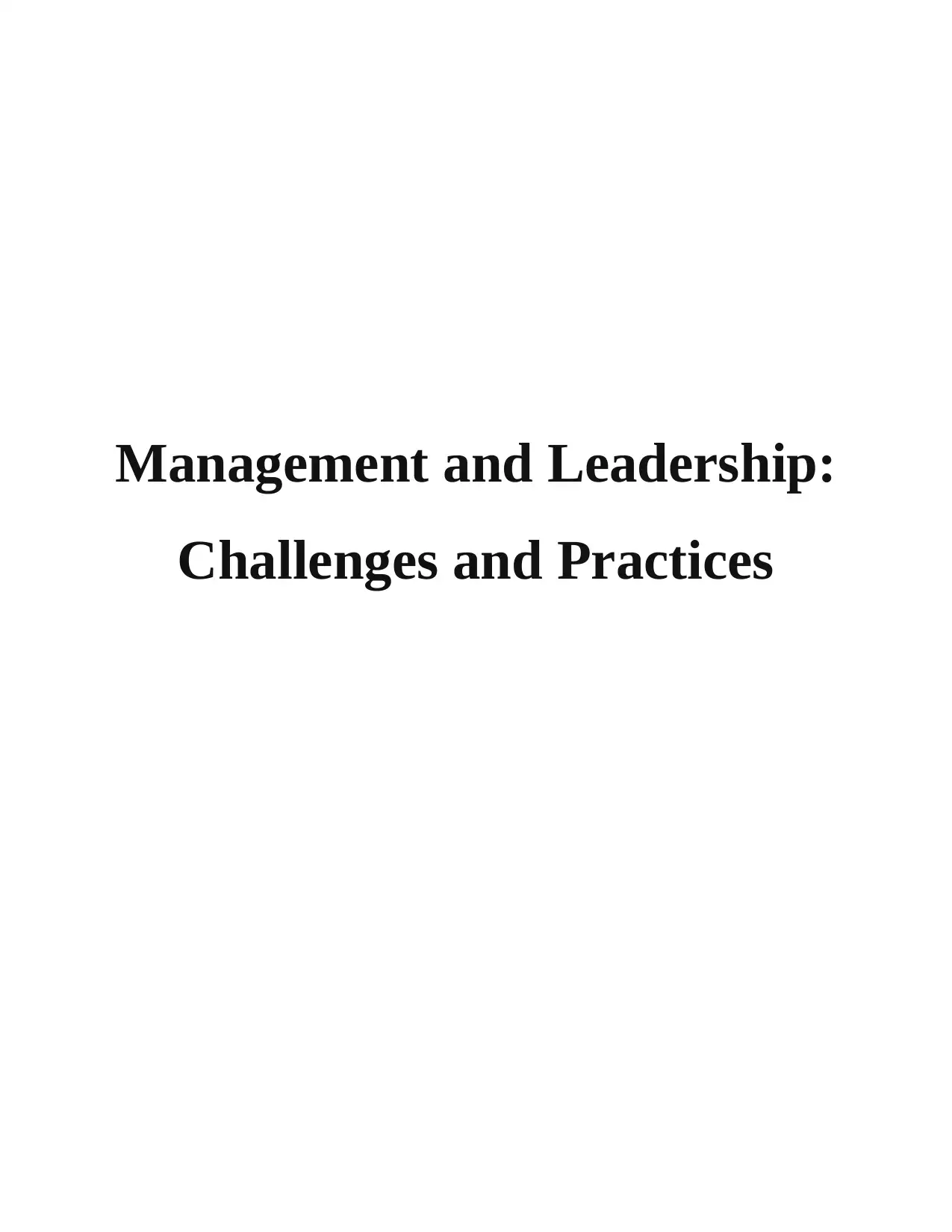
Management and Leadership:
Challenges and Practices
Challenges and Practices
Paraphrase This Document
Need a fresh take? Get an instant paraphrase of this document with our AI Paraphraser
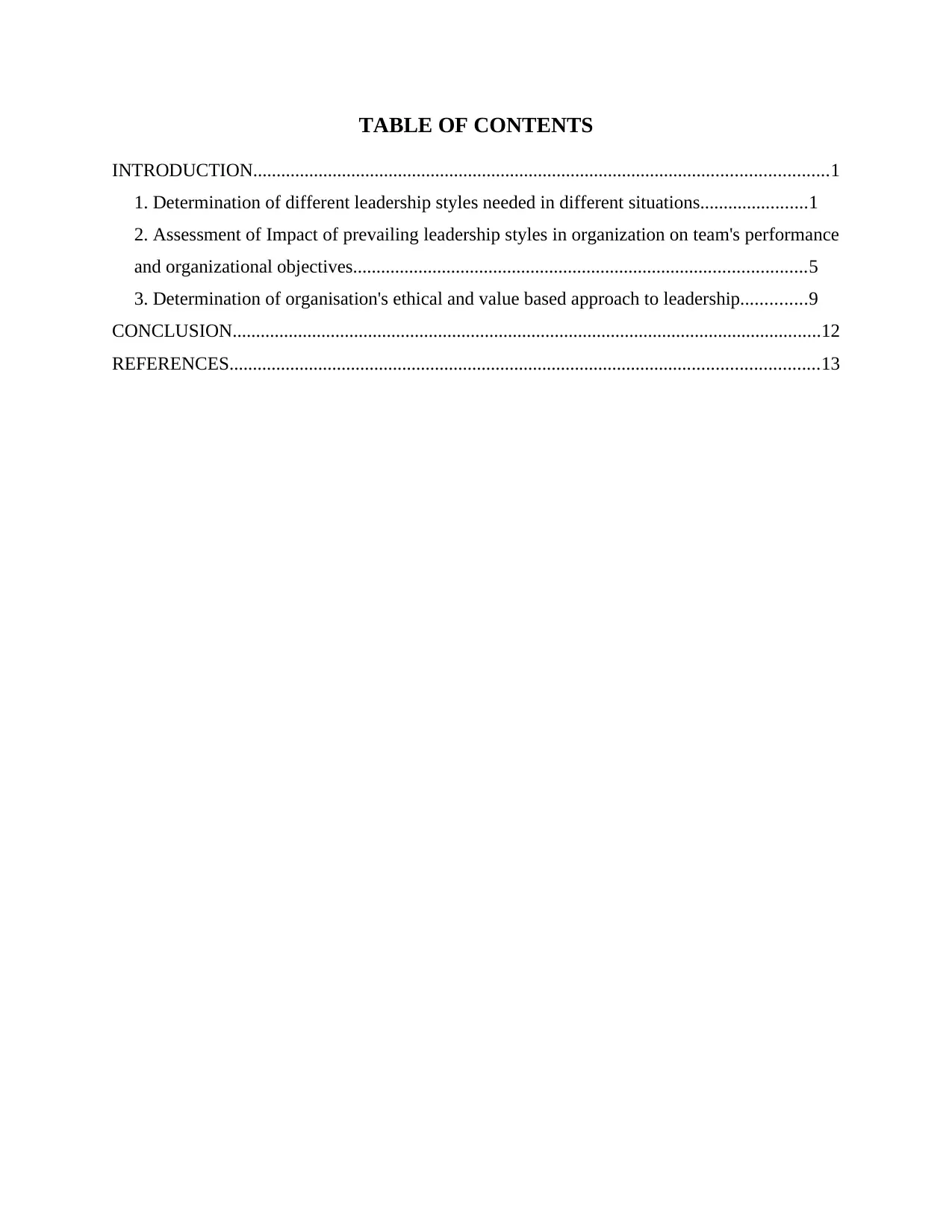
TABLE OF CONTENTS
INTRODUCTION...........................................................................................................................1
1. Determination of different leadership styles needed in different situations.......................1
2. Assessment of Impact of prevailing leadership styles in organization on team's performance
and organizational objectives.................................................................................................5
3. Determination of organisation's ethical and value based approach to leadership..............9
CONCLUSION..............................................................................................................................12
REFERENCES..............................................................................................................................13
INTRODUCTION...........................................................................................................................1
1. Determination of different leadership styles needed in different situations.......................1
2. Assessment of Impact of prevailing leadership styles in organization on team's performance
and organizational objectives.................................................................................................5
3. Determination of organisation's ethical and value based approach to leadership..............9
CONCLUSION..............................................................................................................................12
REFERENCES..............................................................................................................................13
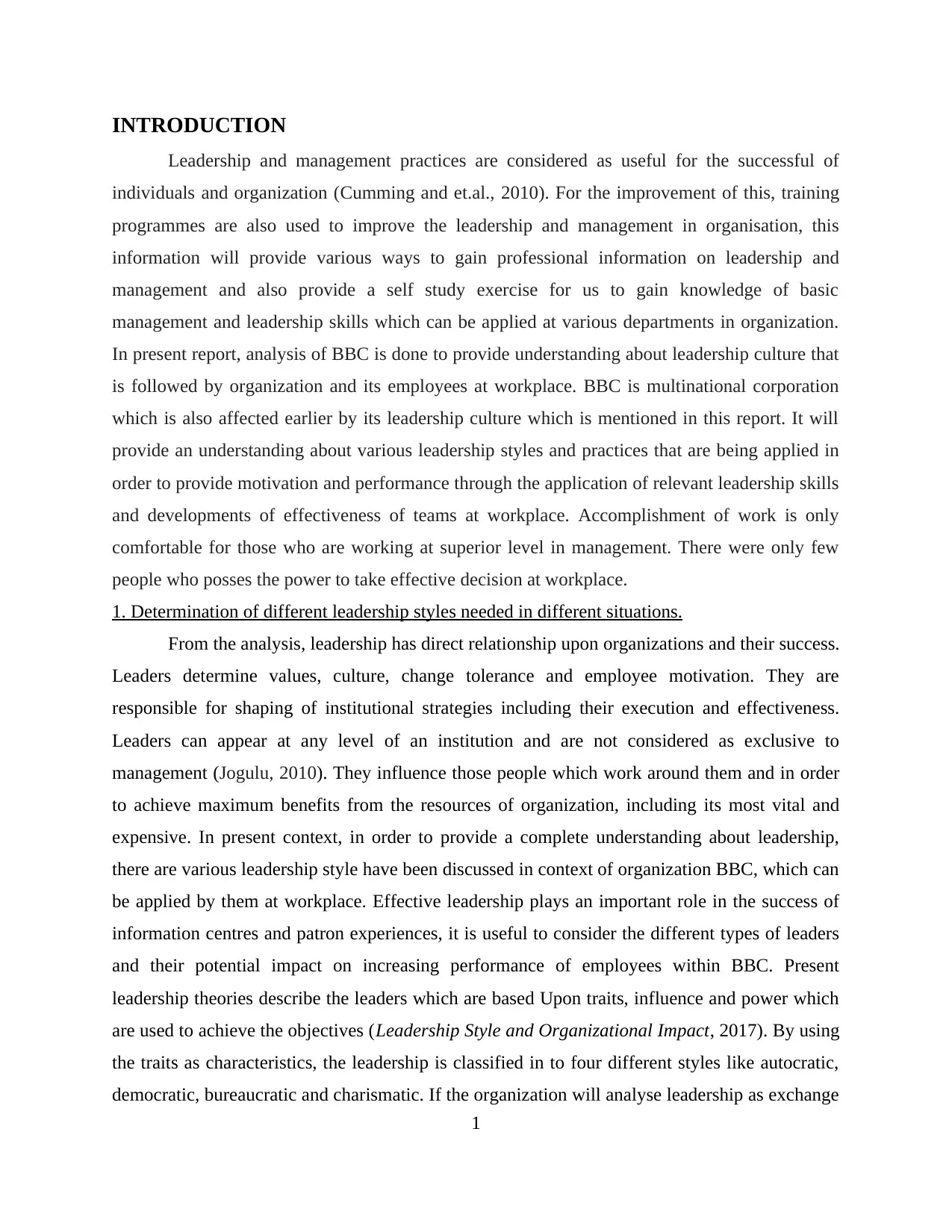
INTRODUCTION
Leadership and management practices are considered as useful for the successful of
individuals and organization (Cumming and et.al., 2010). For the improvement of this, training
programmes are also used to improve the leadership and management in organisation, this
information will provide various ways to gain professional information on leadership and
management and also provide a self study exercise for us to gain knowledge of basic
management and leadership skills which can be applied at various departments in organization.
In present report, analysis of BBC is done to provide understanding about leadership culture that
is followed by organization and its employees at workplace. BBC is multinational corporation
which is also affected earlier by its leadership culture which is mentioned in this report. It will
provide an understanding about various leadership styles and practices that are being applied in
order to provide motivation and performance through the application of relevant leadership skills
and developments of effectiveness of teams at workplace. Accomplishment of work is only
comfortable for those who are working at superior level in management. There were only few
people who posses the power to take effective decision at workplace.
1. Determination of different leadership styles needed in different situations.
From the analysis, leadership has direct relationship upon organizations and their success.
Leaders determine values, culture, change tolerance and employee motivation. They are
responsible for shaping of institutional strategies including their execution and effectiveness.
Leaders can appear at any level of an institution and are not considered as exclusive to
management (Jogulu, 2010). They influence those people which work around them and in order
to achieve maximum benefits from the resources of organization, including its most vital and
expensive. In present context, in order to provide a complete understanding about leadership,
there are various leadership style have been discussed in context of organization BBC, which can
be applied by them at workplace. Effective leadership plays an important role in the success of
information centres and patron experiences, it is useful to consider the different types of leaders
and their potential impact on increasing performance of employees within BBC. Present
leadership theories describe the leaders which are based Upon traits, influence and power which
are used to achieve the objectives (Leadership Style and Organizational Impact, 2017). By using
the traits as characteristics, the leadership is classified in to four different styles like autocratic,
democratic, bureaucratic and charismatic. If the organization will analyse leadership as exchange
1
Leadership and management practices are considered as useful for the successful of
individuals and organization (Cumming and et.al., 2010). For the improvement of this, training
programmes are also used to improve the leadership and management in organisation, this
information will provide various ways to gain professional information on leadership and
management and also provide a self study exercise for us to gain knowledge of basic
management and leadership skills which can be applied at various departments in organization.
In present report, analysis of BBC is done to provide understanding about leadership culture that
is followed by organization and its employees at workplace. BBC is multinational corporation
which is also affected earlier by its leadership culture which is mentioned in this report. It will
provide an understanding about various leadership styles and practices that are being applied in
order to provide motivation and performance through the application of relevant leadership skills
and developments of effectiveness of teams at workplace. Accomplishment of work is only
comfortable for those who are working at superior level in management. There were only few
people who posses the power to take effective decision at workplace.
1. Determination of different leadership styles needed in different situations.
From the analysis, leadership has direct relationship upon organizations and their success.
Leaders determine values, culture, change tolerance and employee motivation. They are
responsible for shaping of institutional strategies including their execution and effectiveness.
Leaders can appear at any level of an institution and are not considered as exclusive to
management (Jogulu, 2010). They influence those people which work around them and in order
to achieve maximum benefits from the resources of organization, including its most vital and
expensive. In present context, in order to provide a complete understanding about leadership,
there are various leadership style have been discussed in context of organization BBC, which can
be applied by them at workplace. Effective leadership plays an important role in the success of
information centres and patron experiences, it is useful to consider the different types of leaders
and their potential impact on increasing performance of employees within BBC. Present
leadership theories describe the leaders which are based Upon traits, influence and power which
are used to achieve the objectives (Leadership Style and Organizational Impact, 2017). By using
the traits as characteristics, the leadership is classified in to four different styles like autocratic,
democratic, bureaucratic and charismatic. If the organization will analyse leadership as exchange
1
⊘ This is a preview!⊘
Do you want full access?
Subscribe today to unlock all pages.

Trusted by 1+ million students worldwide
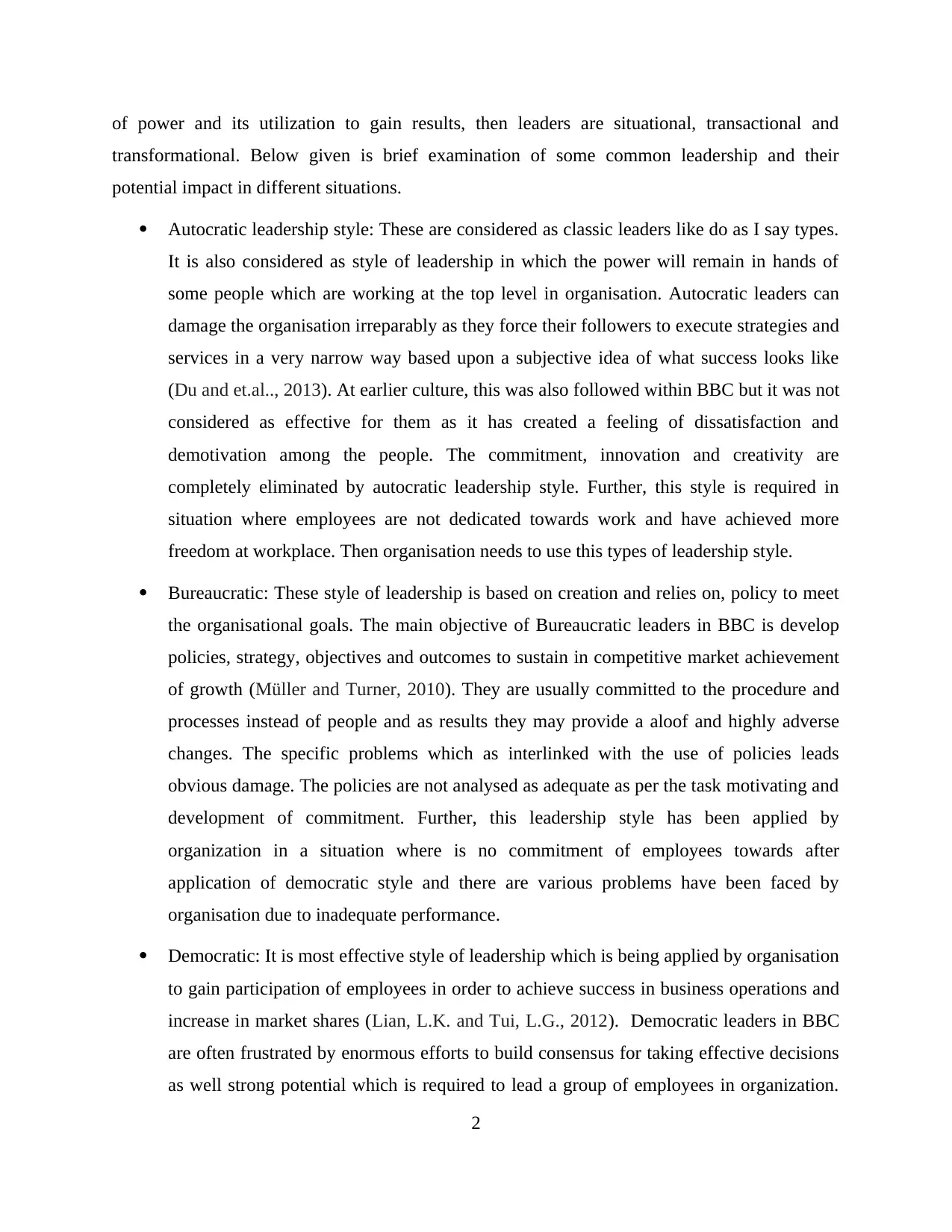
of power and its utilization to gain results, then leaders are situational, transactional and
transformational. Below given is brief examination of some common leadership and their
potential impact in different situations.
Autocratic leadership style: These are considered as classic leaders like do as I say types.
It is also considered as style of leadership in which the power will remain in hands of
some people which are working at the top level in organisation. Autocratic leaders can
damage the organisation irreparably as they force their followers to execute strategies and
services in a very narrow way based upon a subjective idea of what success looks like
(Du and et.al.., 2013). At earlier culture, this was also followed within BBC but it was not
considered as effective for them as it has created a feeling of dissatisfaction and
demotivation among the people. The commitment, innovation and creativity are
completely eliminated by autocratic leadership style. Further, this style is required in
situation where employees are not dedicated towards work and have achieved more
freedom at workplace. Then organisation needs to use this types of leadership style.
Bureaucratic: These style of leadership is based on creation and relies on, policy to meet
the organisational goals. The main objective of Bureaucratic leaders in BBC is develop
policies, strategy, objectives and outcomes to sustain in competitive market achievement
of growth (Müller and Turner, 2010). They are usually committed to the procedure and
processes instead of people and as results they may provide a aloof and highly adverse
changes. The specific problems which as interlinked with the use of policies leads
obvious damage. The policies are not analysed as adequate as per the task motivating and
development of commitment. Further, this leadership style has been applied by
organization in a situation where is no commitment of employees towards after
application of democratic style and there are various problems have been faced by
organisation due to inadequate performance.
Democratic: It is most effective style of leadership which is being applied by organisation
to gain participation of employees in order to achieve success in business operations and
increase in market shares (Lian, L.K. and Tui, L.G., 2012). Democratic leaders in BBC
are often frustrated by enormous efforts to build consensus for taking effective decisions
as well strong potential which is required to lead a group of employees in organization.
2
transformational. Below given is brief examination of some common leadership and their
potential impact in different situations.
Autocratic leadership style: These are considered as classic leaders like do as I say types.
It is also considered as style of leadership in which the power will remain in hands of
some people which are working at the top level in organisation. Autocratic leaders can
damage the organisation irreparably as they force their followers to execute strategies and
services in a very narrow way based upon a subjective idea of what success looks like
(Du and et.al.., 2013). At earlier culture, this was also followed within BBC but it was not
considered as effective for them as it has created a feeling of dissatisfaction and
demotivation among the people. The commitment, innovation and creativity are
completely eliminated by autocratic leadership style. Further, this style is required in
situation where employees are not dedicated towards work and have achieved more
freedom at workplace. Then organisation needs to use this types of leadership style.
Bureaucratic: These style of leadership is based on creation and relies on, policy to meet
the organisational goals. The main objective of Bureaucratic leaders in BBC is develop
policies, strategy, objectives and outcomes to sustain in competitive market achievement
of growth (Müller and Turner, 2010). They are usually committed to the procedure and
processes instead of people and as results they may provide a aloof and highly adverse
changes. The specific problems which as interlinked with the use of policies leads
obvious damage. The policies are not analysed as adequate as per the task motivating and
development of commitment. Further, this leadership style has been applied by
organization in a situation where is no commitment of employees towards after
application of democratic style and there are various problems have been faced by
organisation due to inadequate performance.
Democratic: It is most effective style of leadership which is being applied by organisation
to gain participation of employees in order to achieve success in business operations and
increase in market shares (Lian, L.K. and Tui, L.G., 2012). Democratic leaders in BBC
are often frustrated by enormous efforts to build consensus for taking effective decisions
as well strong potential which is required to lead a group of employees in organization.
2
Paraphrase This Document
Need a fresh take? Get an instant paraphrase of this document with our AI Paraphraser
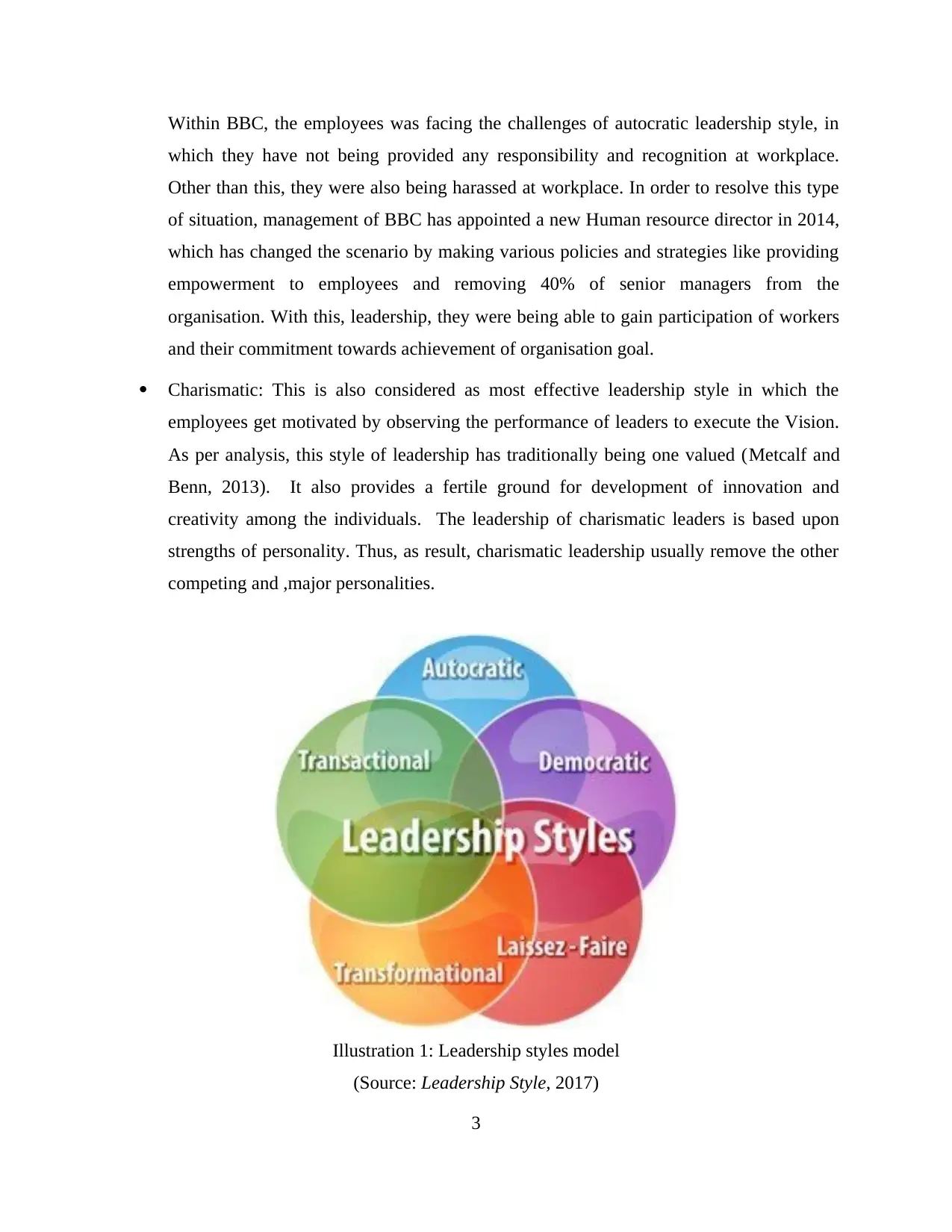
Within BBC, the employees was facing the challenges of autocratic leadership style, in
which they have not being provided any responsibility and recognition at workplace.
Other than this, they were also being harassed at workplace. In order to resolve this type
of situation, management of BBC has appointed a new Human resource director in 2014,
which has changed the scenario by making various policies and strategies like providing
empowerment to employees and removing 40% of senior managers from the
organisation. With this, leadership, they were being able to gain participation of workers
and their commitment towards achievement of organisation goal.
Charismatic: This is also considered as most effective leadership style in which the
employees get motivated by observing the performance of leaders to execute the Vision.
As per analysis, this style of leadership has traditionally being one valued (Metcalf and
Benn, 2013). It also provides a fertile ground for development of innovation and
creativity among the individuals. The leadership of charismatic leaders is based upon
strengths of personality. Thus, as result, charismatic leadership usually remove the other
competing and ,major personalities.
3
Illustration 1: Leadership styles model
(Source: Leadership Style, 2017)
which they have not being provided any responsibility and recognition at workplace.
Other than this, they were also being harassed at workplace. In order to resolve this type
of situation, management of BBC has appointed a new Human resource director in 2014,
which has changed the scenario by making various policies and strategies like providing
empowerment to employees and removing 40% of senior managers from the
organisation. With this, leadership, they were being able to gain participation of workers
and their commitment towards achievement of organisation goal.
Charismatic: This is also considered as most effective leadership style in which the
employees get motivated by observing the performance of leaders to execute the Vision.
As per analysis, this style of leadership has traditionally being one valued (Metcalf and
Benn, 2013). It also provides a fertile ground for development of innovation and
creativity among the individuals. The leadership of charismatic leaders is based upon
strengths of personality. Thus, as result, charismatic leadership usually remove the other
competing and ,major personalities.
3
Illustration 1: Leadership styles model
(Source: Leadership Style, 2017)
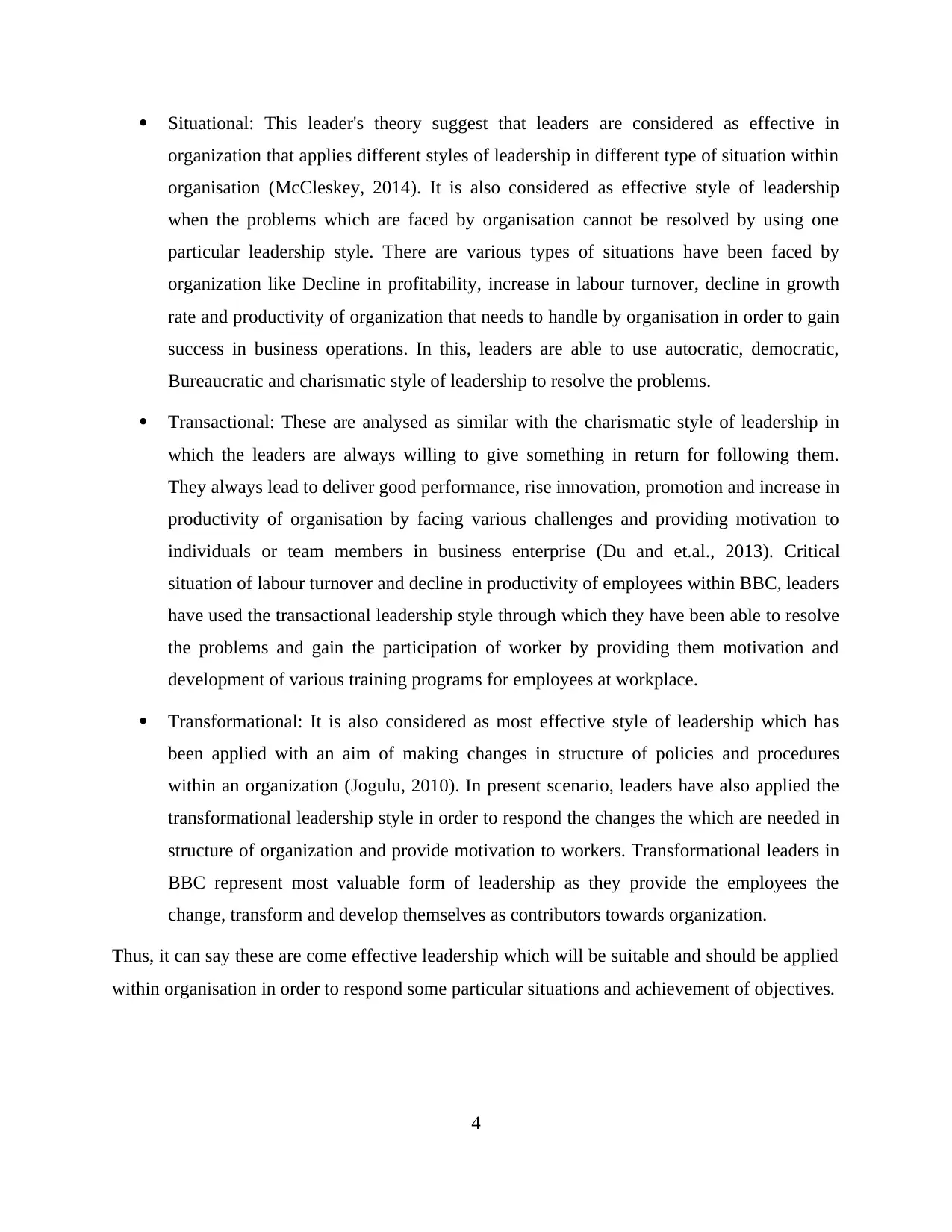
Situational: This leader's theory suggest that leaders are considered as effective in
organization that applies different styles of leadership in different type of situation within
organisation (McCleskey, 2014). It is also considered as effective style of leadership
when the problems which are faced by organisation cannot be resolved by using one
particular leadership style. There are various types of situations have been faced by
organization like Decline in profitability, increase in labour turnover, decline in growth
rate and productivity of organization that needs to handle by organisation in order to gain
success in business operations. In this, leaders are able to use autocratic, democratic,
Bureaucratic and charismatic style of leadership to resolve the problems.
Transactional: These are analysed as similar with the charismatic style of leadership in
which the leaders are always willing to give something in return for following them.
They always lead to deliver good performance, rise innovation, promotion and increase in
productivity of organisation by facing various challenges and providing motivation to
individuals or team members in business enterprise (Du and et.al., 2013). Critical
situation of labour turnover and decline in productivity of employees within BBC, leaders
have used the transactional leadership style through which they have been able to resolve
the problems and gain the participation of worker by providing them motivation and
development of various training programs for employees at workplace.
Transformational: It is also considered as most effective style of leadership which has
been applied with an aim of making changes in structure of policies and procedures
within an organization (Jogulu, 2010). In present scenario, leaders have also applied the
transformational leadership style in order to respond the changes the which are needed in
structure of organization and provide motivation to workers. Transformational leaders in
BBC represent most valuable form of leadership as they provide the employees the
change, transform and develop themselves as contributors towards organization.
Thus, it can say these are come effective leadership which will be suitable and should be applied
within organisation in order to respond some particular situations and achievement of objectives.
4
organization that applies different styles of leadership in different type of situation within
organisation (McCleskey, 2014). It is also considered as effective style of leadership
when the problems which are faced by organisation cannot be resolved by using one
particular leadership style. There are various types of situations have been faced by
organization like Decline in profitability, increase in labour turnover, decline in growth
rate and productivity of organization that needs to handle by organisation in order to gain
success in business operations. In this, leaders are able to use autocratic, democratic,
Bureaucratic and charismatic style of leadership to resolve the problems.
Transactional: These are analysed as similar with the charismatic style of leadership in
which the leaders are always willing to give something in return for following them.
They always lead to deliver good performance, rise innovation, promotion and increase in
productivity of organisation by facing various challenges and providing motivation to
individuals or team members in business enterprise (Du and et.al., 2013). Critical
situation of labour turnover and decline in productivity of employees within BBC, leaders
have used the transactional leadership style through which they have been able to resolve
the problems and gain the participation of worker by providing them motivation and
development of various training programs for employees at workplace.
Transformational: It is also considered as most effective style of leadership which has
been applied with an aim of making changes in structure of policies and procedures
within an organization (Jogulu, 2010). In present scenario, leaders have also applied the
transformational leadership style in order to respond the changes the which are needed in
structure of organization and provide motivation to workers. Transformational leaders in
BBC represent most valuable form of leadership as they provide the employees the
change, transform and develop themselves as contributors towards organization.
Thus, it can say these are come effective leadership which will be suitable and should be applied
within organisation in order to respond some particular situations and achievement of objectives.
4
⊘ This is a preview!⊘
Do you want full access?
Subscribe today to unlock all pages.

Trusted by 1+ million students worldwide
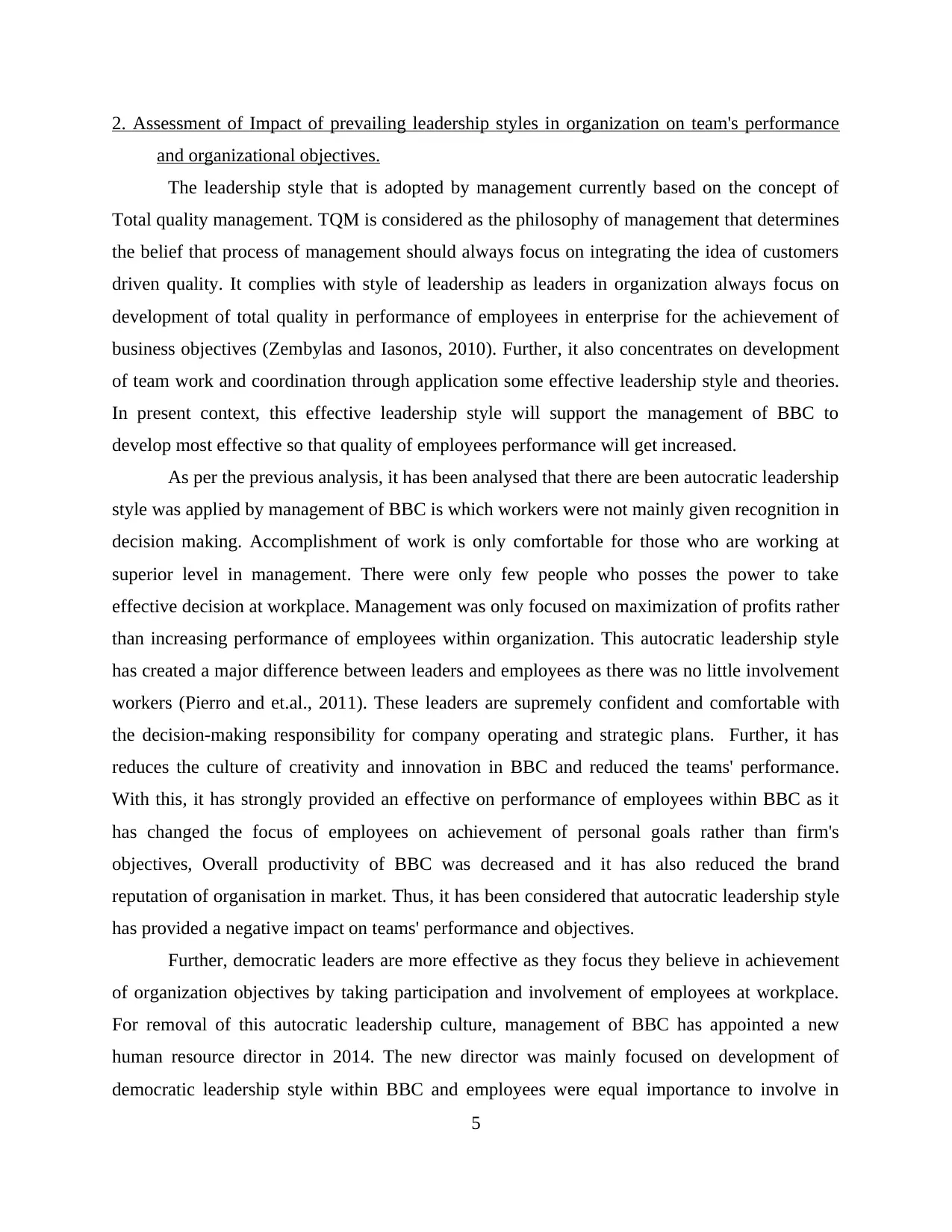
2. Assessment of Impact of prevailing leadership styles in organization on team's performance
and organizational objectives.
The leadership style that is adopted by management currently based on the concept of
Total quality management. TQM is considered as the philosophy of management that determines
the belief that process of management should always focus on integrating the idea of customers
driven quality. It complies with style of leadership as leaders in organization always focus on
development of total quality in performance of employees in enterprise for the achievement of
business objectives (Zembylas and Iasonos, 2010). Further, it also concentrates on development
of team work and coordination through application some effective leadership style and theories.
In present context, this effective leadership style will support the management of BBC to
develop most effective so that quality of employees performance will get increased.
As per the previous analysis, it has been analysed that there are been autocratic leadership
style was applied by management of BBC is which workers were not mainly given recognition in
decision making. Accomplishment of work is only comfortable for those who are working at
superior level in management. There were only few people who posses the power to take
effective decision at workplace. Management was only focused on maximization of profits rather
than increasing performance of employees within organization. This autocratic leadership style
has created a major difference between leaders and employees as there was no little involvement
workers (Pierro and et.al., 2011). These leaders are supremely confident and comfortable with
the decision-making responsibility for company operating and strategic plans. Further, it has
reduces the culture of creativity and innovation in BBC and reduced the teams' performance.
With this, it has strongly provided an effective on performance of employees within BBC as it
has changed the focus of employees on achievement of personal goals rather than firm's
objectives, Overall productivity of BBC was decreased and it has also reduced the brand
reputation of organisation in market. Thus, it has been considered that autocratic leadership style
has provided a negative impact on teams' performance and objectives.
Further, democratic leaders are more effective as they focus they believe in achievement
of organization objectives by taking participation and involvement of employees at workplace.
For removal of this autocratic leadership culture, management of BBC has appointed a new
human resource director in 2014. The new director was mainly focused on development of
democratic leadership style within BBC and employees were equal importance to involve in
5
and organizational objectives.
The leadership style that is adopted by management currently based on the concept of
Total quality management. TQM is considered as the philosophy of management that determines
the belief that process of management should always focus on integrating the idea of customers
driven quality. It complies with style of leadership as leaders in organization always focus on
development of total quality in performance of employees in enterprise for the achievement of
business objectives (Zembylas and Iasonos, 2010). Further, it also concentrates on development
of team work and coordination through application some effective leadership style and theories.
In present context, this effective leadership style will support the management of BBC to
develop most effective so that quality of employees performance will get increased.
As per the previous analysis, it has been analysed that there are been autocratic leadership
style was applied by management of BBC is which workers were not mainly given recognition in
decision making. Accomplishment of work is only comfortable for those who are working at
superior level in management. There were only few people who posses the power to take
effective decision at workplace. Management was only focused on maximization of profits rather
than increasing performance of employees within organization. This autocratic leadership style
has created a major difference between leaders and employees as there was no little involvement
workers (Pierro and et.al., 2011). These leaders are supremely confident and comfortable with
the decision-making responsibility for company operating and strategic plans. Further, it has
reduces the culture of creativity and innovation in BBC and reduced the teams' performance.
With this, it has strongly provided an effective on performance of employees within BBC as it
has changed the focus of employees on achievement of personal goals rather than firm's
objectives, Overall productivity of BBC was decreased and it has also reduced the brand
reputation of organisation in market. Thus, it has been considered that autocratic leadership style
has provided a negative impact on teams' performance and objectives.
Further, democratic leaders are more effective as they focus they believe in achievement
of organization objectives by taking participation and involvement of employees at workplace.
For removal of this autocratic leadership culture, management of BBC has appointed a new
human resource director in 2014. The new director was mainly focused on development of
democratic leadership style within BBC and employees were equal importance to involve in
5
Paraphrase This Document
Need a fresh take? Get an instant paraphrase of this document with our AI Paraphraser
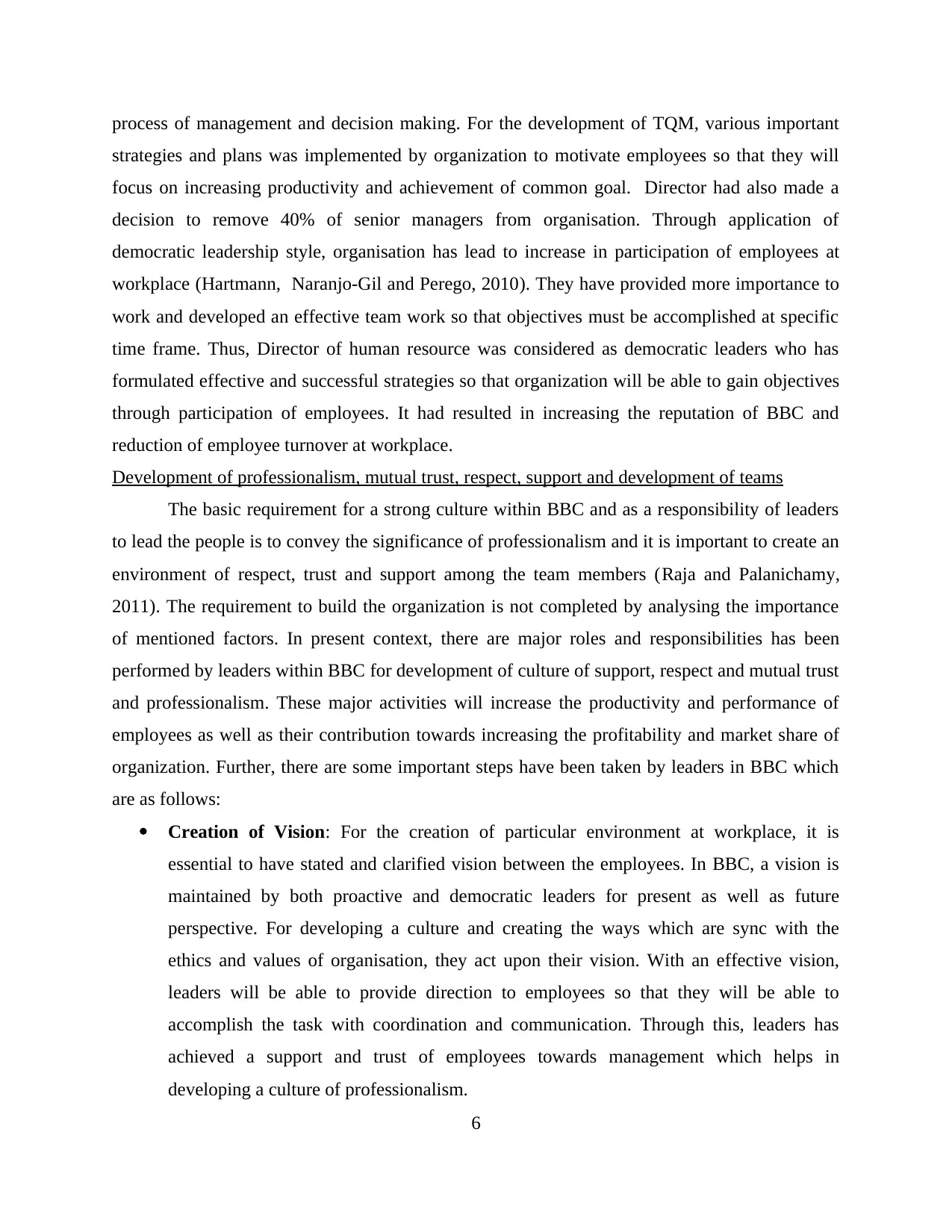
process of management and decision making. For the development of TQM, various important
strategies and plans was implemented by organization to motivate employees so that they will
focus on increasing productivity and achievement of common goal. Director had also made a
decision to remove 40% of senior managers from organisation. Through application of
democratic leadership style, organisation has lead to increase in participation of employees at
workplace (Hartmann, Naranjo-Gil and Perego, 2010). They have provided more importance to
work and developed an effective team work so that objectives must be accomplished at specific
time frame. Thus, Director of human resource was considered as democratic leaders who has
formulated effective and successful strategies so that organization will be able to gain objectives
through participation of employees. It had resulted in increasing the reputation of BBC and
reduction of employee turnover at workplace.
Development of professionalism, mutual trust, respect, support and development of teams
The basic requirement for a strong culture within BBC and as a responsibility of leaders
to lead the people is to convey the significance of professionalism and it is important to create an
environment of respect, trust and support among the team members (Raja and Palanichamy,
2011). The requirement to build the organization is not completed by analysing the importance
of mentioned factors. In present context, there are major roles and responsibilities has been
performed by leaders within BBC for development of culture of support, respect and mutual trust
and professionalism. These major activities will increase the productivity and performance of
employees as well as their contribution towards increasing the profitability and market share of
organization. Further, there are some important steps have been taken by leaders in BBC which
are as follows:
Creation of Vision: For the creation of particular environment at workplace, it is
essential to have stated and clarified vision between the employees. In BBC, a vision is
maintained by both proactive and democratic leaders for present as well as future
perspective. For developing a culture and creating the ways which are sync with the
ethics and values of organisation, they act upon their vision. With an effective vision,
leaders will be able to provide direction to employees so that they will be able to
accomplish the task with coordination and communication. Through this, leaders has
achieved a support and trust of employees towards management which helps in
developing a culture of professionalism.
6
strategies and plans was implemented by organization to motivate employees so that they will
focus on increasing productivity and achievement of common goal. Director had also made a
decision to remove 40% of senior managers from organisation. Through application of
democratic leadership style, organisation has lead to increase in participation of employees at
workplace (Hartmann, Naranjo-Gil and Perego, 2010). They have provided more importance to
work and developed an effective team work so that objectives must be accomplished at specific
time frame. Thus, Director of human resource was considered as democratic leaders who has
formulated effective and successful strategies so that organization will be able to gain objectives
through participation of employees. It had resulted in increasing the reputation of BBC and
reduction of employee turnover at workplace.
Development of professionalism, mutual trust, respect, support and development of teams
The basic requirement for a strong culture within BBC and as a responsibility of leaders
to lead the people is to convey the significance of professionalism and it is important to create an
environment of respect, trust and support among the team members (Raja and Palanichamy,
2011). The requirement to build the organization is not completed by analysing the importance
of mentioned factors. In present context, there are major roles and responsibilities has been
performed by leaders within BBC for development of culture of support, respect and mutual trust
and professionalism. These major activities will increase the productivity and performance of
employees as well as their contribution towards increasing the profitability and market share of
organization. Further, there are some important steps have been taken by leaders in BBC which
are as follows:
Creation of Vision: For the creation of particular environment at workplace, it is
essential to have stated and clarified vision between the employees. In BBC, a vision is
maintained by both proactive and democratic leaders for present as well as future
perspective. For developing a culture and creating the ways which are sync with the
ethics and values of organisation, they act upon their vision. With an effective vision,
leaders will be able to provide direction to employees so that they will be able to
accomplish the task with coordination and communication. Through this, leaders has
achieved a support and trust of employees towards management which helps in
developing a culture of professionalism.
6
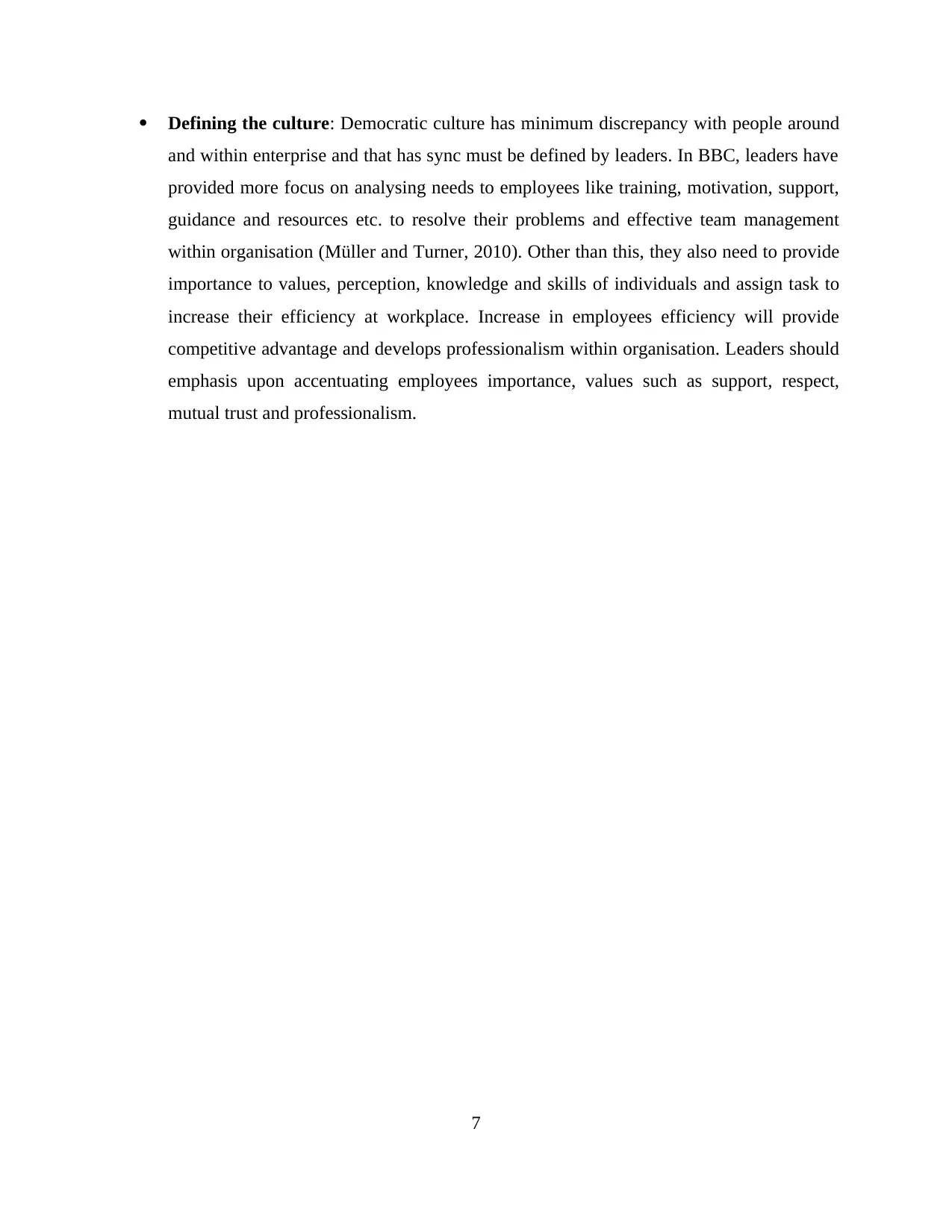
Defining the culture: Democratic culture has minimum discrepancy with people around
and within enterprise and that has sync must be defined by leaders. In BBC, leaders have
provided more focus on analysing needs to employees like training, motivation, support,
guidance and resources etc. to resolve their problems and effective team management
within organisation (Müller and Turner, 2010). Other than this, they also need to provide
importance to values, perception, knowledge and skills of individuals and assign task to
increase their efficiency at workplace. Increase in employees efficiency will provide
competitive advantage and develops professionalism within organisation. Leaders should
emphasis upon accentuating employees importance, values such as support, respect,
mutual trust and professionalism.
7
and within enterprise and that has sync must be defined by leaders. In BBC, leaders have
provided more focus on analysing needs to employees like training, motivation, support,
guidance and resources etc. to resolve their problems and effective team management
within organisation (Müller and Turner, 2010). Other than this, they also need to provide
importance to values, perception, knowledge and skills of individuals and assign task to
increase their efficiency at workplace. Increase in employees efficiency will provide
competitive advantage and develops professionalism within organisation. Leaders should
emphasis upon accentuating employees importance, values such as support, respect,
mutual trust and professionalism.
7
⊘ This is a preview!⊘
Do you want full access?
Subscribe today to unlock all pages.

Trusted by 1+ million students worldwide
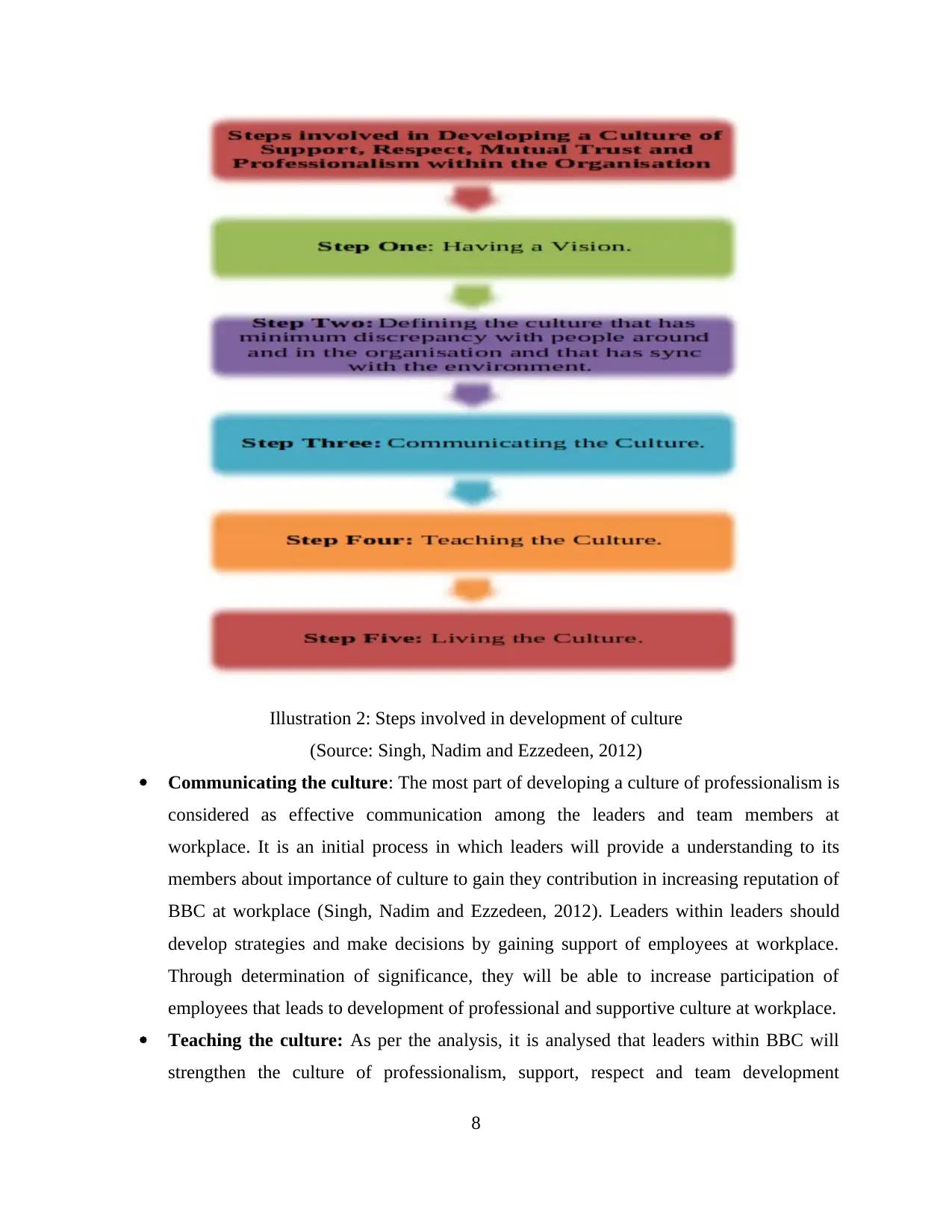
Communicating the culture: The most part of developing a culture of professionalism is
considered as effective communication among the leaders and team members at
workplace. It is an initial process in which leaders will provide a understanding to its
members about importance of culture to gain they contribution in increasing reputation of
BBC at workplace (Singh, Nadim and Ezzedeen, 2012). Leaders within leaders should
develop strategies and make decisions by gaining support of employees at workplace.
Through determination of significance, they will be able to increase participation of
employees that leads to development of professional and supportive culture at workplace.
Teaching the culture: As per the analysis, it is analysed that leaders within BBC will
strengthen the culture of professionalism, support, respect and team development
8
Illustration 2: Steps involved in development of culture
(Source: Singh, Nadim and Ezzedeen, 2012)
considered as effective communication among the leaders and team members at
workplace. It is an initial process in which leaders will provide a understanding to its
members about importance of culture to gain they contribution in increasing reputation of
BBC at workplace (Singh, Nadim and Ezzedeen, 2012). Leaders within leaders should
develop strategies and make decisions by gaining support of employees at workplace.
Through determination of significance, they will be able to increase participation of
employees that leads to development of professional and supportive culture at workplace.
Teaching the culture: As per the analysis, it is analysed that leaders within BBC will
strengthen the culture of professionalism, support, respect and team development
8
Illustration 2: Steps involved in development of culture
(Source: Singh, Nadim and Ezzedeen, 2012)
Paraphrase This Document
Need a fresh take? Get an instant paraphrase of this document with our AI Paraphraser
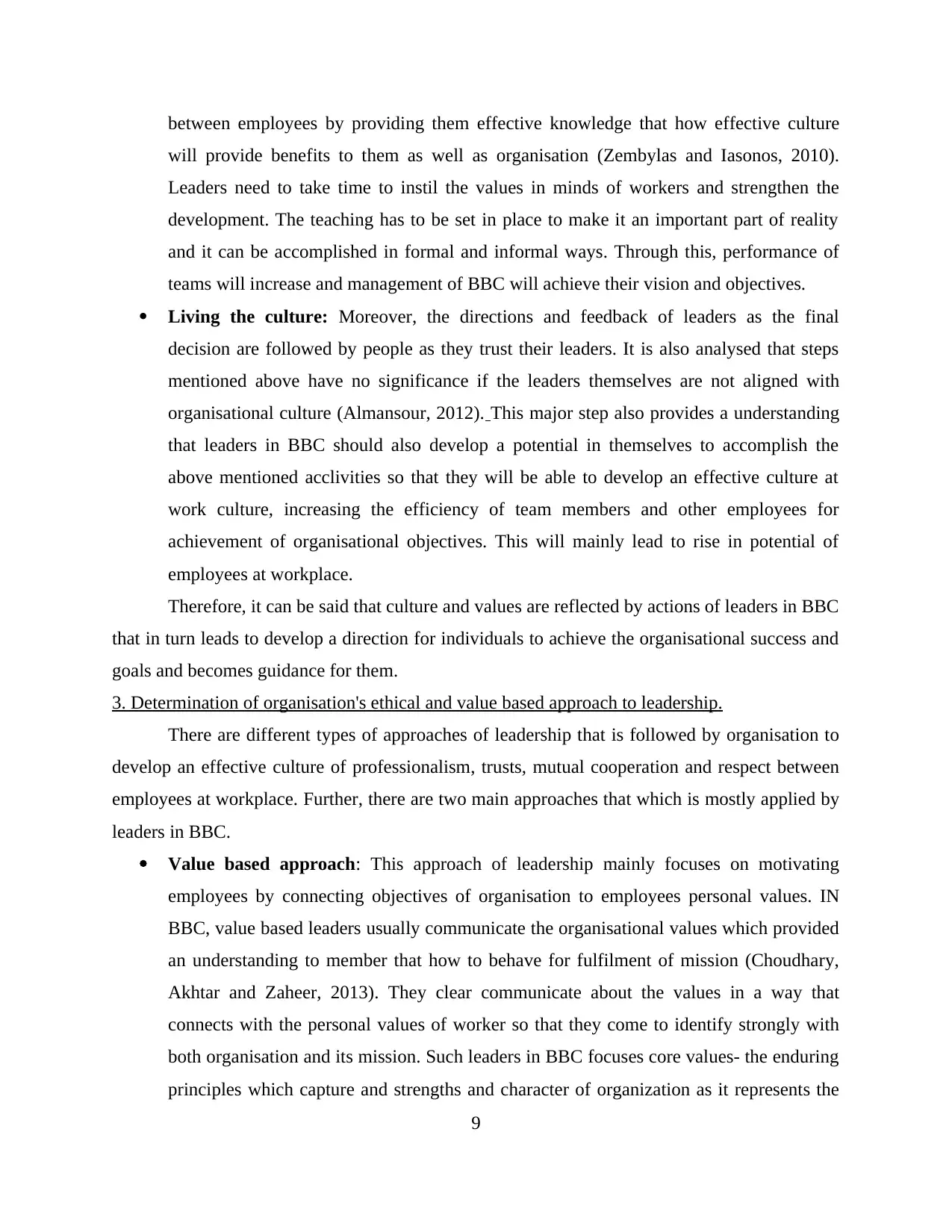
between employees by providing them effective knowledge that how effective culture
will provide benefits to them as well as organisation (Zembylas and Iasonos, 2010).
Leaders need to take time to instil the values in minds of workers and strengthen the
development. The teaching has to be set in place to make it an important part of reality
and it can be accomplished in formal and informal ways. Through this, performance of
teams will increase and management of BBC will achieve their vision and objectives.
Living the culture: Moreover, the directions and feedback of leaders as the final
decision are followed by people as they trust their leaders. It is also analysed that steps
mentioned above have no significance if the leaders themselves are not aligned with
organisational culture (Almansour, 2012). This major step also provides a understanding
that leaders in BBC should also develop a potential in themselves to accomplish the
above mentioned acclivities so that they will be able to develop an effective culture at
work culture, increasing the efficiency of team members and other employees for
achievement of organisational objectives. This will mainly lead to rise in potential of
employees at workplace.
Therefore, it can be said that culture and values are reflected by actions of leaders in BBC
that in turn leads to develop a direction for individuals to achieve the organisational success and
goals and becomes guidance for them.
3. Determination of organisation's ethical and value based approach to leadership.
There are different types of approaches of leadership that is followed by organisation to
develop an effective culture of professionalism, trusts, mutual cooperation and respect between
employees at workplace. Further, there are two main approaches that which is mostly applied by
leaders in BBC.
Value based approach: This approach of leadership mainly focuses on motivating
employees by connecting objectives of organisation to employees personal values. IN
BBC, value based leaders usually communicate the organisational values which provided
an understanding to member that how to behave for fulfilment of mission (Choudhary,
Akhtar and Zaheer, 2013). They clear communicate about the values in a way that
connects with the personal values of worker so that they come to identify strongly with
both organisation and its mission. Such leaders in BBC focuses core values- the enduring
principles which capture and strengths and character of organization as it represents the
9
will provide benefits to them as well as organisation (Zembylas and Iasonos, 2010).
Leaders need to take time to instil the values in minds of workers and strengthen the
development. The teaching has to be set in place to make it an important part of reality
and it can be accomplished in formal and informal ways. Through this, performance of
teams will increase and management of BBC will achieve their vision and objectives.
Living the culture: Moreover, the directions and feedback of leaders as the final
decision are followed by people as they trust their leaders. It is also analysed that steps
mentioned above have no significance if the leaders themselves are not aligned with
organisational culture (Almansour, 2012). This major step also provides a understanding
that leaders in BBC should also develop a potential in themselves to accomplish the
above mentioned acclivities so that they will be able to develop an effective culture at
work culture, increasing the efficiency of team members and other employees for
achievement of organisational objectives. This will mainly lead to rise in potential of
employees at workplace.
Therefore, it can be said that culture and values are reflected by actions of leaders in BBC
that in turn leads to develop a direction for individuals to achieve the organisational success and
goals and becomes guidance for them.
3. Determination of organisation's ethical and value based approach to leadership.
There are different types of approaches of leadership that is followed by organisation to
develop an effective culture of professionalism, trusts, mutual cooperation and respect between
employees at workplace. Further, there are two main approaches that which is mostly applied by
leaders in BBC.
Value based approach: This approach of leadership mainly focuses on motivating
employees by connecting objectives of organisation to employees personal values. IN
BBC, value based leaders usually communicate the organisational values which provided
an understanding to member that how to behave for fulfilment of mission (Choudhary,
Akhtar and Zaheer, 2013). They clear communicate about the values in a way that
connects with the personal values of worker so that they come to identify strongly with
both organisation and its mission. Such leaders in BBC focuses core values- the enduring
principles which capture and strengths and character of organization as it represents the
9
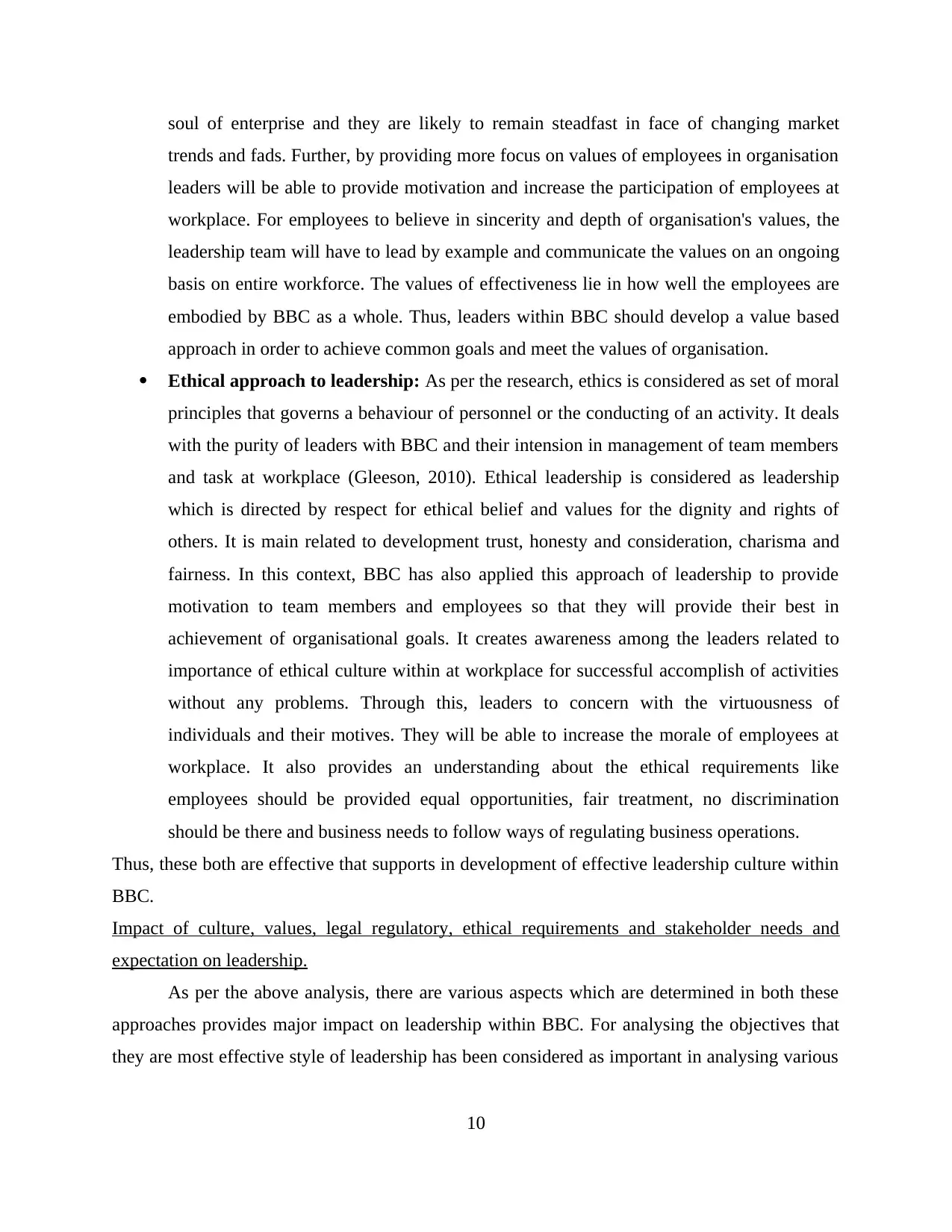
soul of enterprise and they are likely to remain steadfast in face of changing market
trends and fads. Further, by providing more focus on values of employees in organisation
leaders will be able to provide motivation and increase the participation of employees at
workplace. For employees to believe in sincerity and depth of organisation's values, the
leadership team will have to lead by example and communicate the values on an ongoing
basis on entire workforce. The values of effectiveness lie in how well the employees are
embodied by BBC as a whole. Thus, leaders within BBC should develop a value based
approach in order to achieve common goals and meet the values of organisation.
Ethical approach to leadership: As per the research, ethics is considered as set of moral
principles that governs a behaviour of personnel or the conducting of an activity. It deals
with the purity of leaders with BBC and their intension in management of team members
and task at workplace (Gleeson, 2010). Ethical leadership is considered as leadership
which is directed by respect for ethical belief and values for the dignity and rights of
others. It is main related to development trust, honesty and consideration, charisma and
fairness. In this context, BBC has also applied this approach of leadership to provide
motivation to team members and employees so that they will provide their best in
achievement of organisational goals. It creates awareness among the leaders related to
importance of ethical culture within at workplace for successful accomplish of activities
without any problems. Through this, leaders to concern with the virtuousness of
individuals and their motives. They will be able to increase the morale of employees at
workplace. It also provides an understanding about the ethical requirements like
employees should be provided equal opportunities, fair treatment, no discrimination
should be there and business needs to follow ways of regulating business operations.
Thus, these both are effective that supports in development of effective leadership culture within
BBC.
Impact of culture, values, legal regulatory, ethical requirements and stakeholder needs and
expectation on leadership.
As per the above analysis, there are various aspects which are determined in both these
approaches provides major impact on leadership within BBC. For analysing the objectives that
they are most effective style of leadership has been considered as important in analysing various
10
trends and fads. Further, by providing more focus on values of employees in organisation
leaders will be able to provide motivation and increase the participation of employees at
workplace. For employees to believe in sincerity and depth of organisation's values, the
leadership team will have to lead by example and communicate the values on an ongoing
basis on entire workforce. The values of effectiveness lie in how well the employees are
embodied by BBC as a whole. Thus, leaders within BBC should develop a value based
approach in order to achieve common goals and meet the values of organisation.
Ethical approach to leadership: As per the research, ethics is considered as set of moral
principles that governs a behaviour of personnel or the conducting of an activity. It deals
with the purity of leaders with BBC and their intension in management of team members
and task at workplace (Gleeson, 2010). Ethical leadership is considered as leadership
which is directed by respect for ethical belief and values for the dignity and rights of
others. It is main related to development trust, honesty and consideration, charisma and
fairness. In this context, BBC has also applied this approach of leadership to provide
motivation to team members and employees so that they will provide their best in
achievement of organisational goals. It creates awareness among the leaders related to
importance of ethical culture within at workplace for successful accomplish of activities
without any problems. Through this, leaders to concern with the virtuousness of
individuals and their motives. They will be able to increase the morale of employees at
workplace. It also provides an understanding about the ethical requirements like
employees should be provided equal opportunities, fair treatment, no discrimination
should be there and business needs to follow ways of regulating business operations.
Thus, these both are effective that supports in development of effective leadership culture within
BBC.
Impact of culture, values, legal regulatory, ethical requirements and stakeholder needs and
expectation on leadership.
As per the above analysis, there are various aspects which are determined in both these
approaches provides major impact on leadership within BBC. For analysing the objectives that
they are most effective style of leadership has been considered as important in analysing various
10
⊘ This is a preview!⊘
Do you want full access?
Subscribe today to unlock all pages.

Trusted by 1+ million students worldwide
1 out of 16
Related Documents
Your All-in-One AI-Powered Toolkit for Academic Success.
+13062052269
info@desklib.com
Available 24*7 on WhatsApp / Email
![[object Object]](/_next/static/media/star-bottom.7253800d.svg)
Unlock your academic potential
Copyright © 2020–2026 A2Z Services. All Rights Reserved. Developed and managed by ZUCOL.





